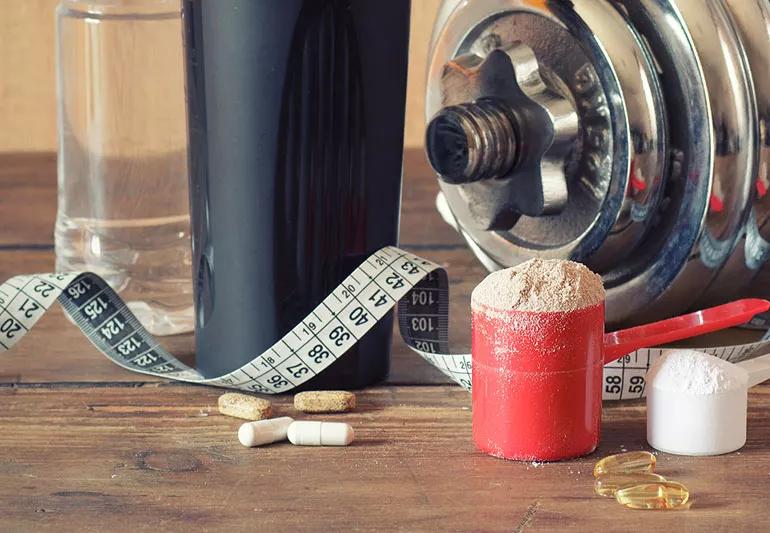The effects of supplements for athletes

Image content: This image is available to view online.
View image online (https://assets.clevelandclinic.org/transform/4d389594-8c1b-4161-9ba0-658945be27d3/ketoSupplments-471775270-770x533-1_jpg)
Keto supplements for workouts
Whether you want to beat the competition or outdo your own personal best, you may find yourself always looking for an advantage as an athlete. To that end, you may have heard buzz about ketone supplements and how they can boost your workouts by helping your body use fatty acids for fuel.
Advertisement
Cleveland Clinic is a non-profit academic medical center. Advertising on our site helps support our mission. We do not endorse non-Cleveland Clinic products or services. Policy
But do they work as advertised? And are they healthy?
Registered dietitian Ariana Fiorita, RDN, LD, IFNCP discusses the pros and cons of ketone supplements and whether they can deliver what you need as an athlete.
The first thing to understand, she says, is what it means when the body is in a state of ketosis.
The body typically burns carbohydrates to fuel muscles when you’re active. But if you don’t provide the carbs, the body will turn to fat.
“The term ketosis refers to a process when you restrict the human body of carbohydrates to the point where it begins to break down fatty acids for fuel,” Fiorita says. “Ketones are the byproduct of this breakdown.”
Ketosis occurs naturally after prolonged exercise, during starvation, when you’re fasting or when you’re following a diet that is very low in carbohydrates, such as the keto diet.
But reaching ketosis is difficult for some people.
Your body needs time to adjust to a low-carbohydrate diet. And you likely won’t feel or perform at your best during that process. That’s why some athletes look to supplements.
“People use ketone supplements in a situation when they would like to reach a state of ketosis more quickly or stay in a state of ketosis more efficiently,” says Fiorita.
Advertisement
“Ketone supplementation may help you get into ketosis, but it’s not providing your body with any form of nutrition or added metabolic health benefits,” says Fiorita.
She adds that you may think more clearly and notice appetite suppression when taking ketone supplements, but they don’t actually help your body burn fat.
To help understand if they’re beneficial for you as an athlete, Fiorita suggests that you ask yourself two questions:
Despite the time involved and the sluggishness you may experience as your body adjusts to a ketogenic (low-carb, high-fat) diet, it may benefit you in the long run.
Fiorita says that following an entirely food-based ketogenic diet without supplementation is often beneficial to athletic performance, particularly for ultra-endurance athletes.
These diets work because our bodies can store significantly more fat than carbohydrates for use as a steady source of fuel for long-lasting sports, she says. Without additional supplementation, the human body will utilize its own fat reserves instead of relying on an outside source.
“Ultimately, the key is to team with a medical professional who is well trained in ketogenic diets in order to ensure that you are meeting your health and performance goals safely and effectively,” Fiorita concludes.
Advertisement

Sign up for our Health Essentials emails for expert guidance on nutrition, fitness, sleep, skin care and more.
Learn more about our editorial process.
Advertisement
They claim to boost energy and improve longevity, but there’s currently not enough research to confirm these benefits
Certain supplements, like licorice root and St. John’s wort, can raise your blood pressure or negatively interact with medication
Properly prepared, elderberries can be a safe and healthy part of a balanced diet — just steer clear of supplements
Science doesn’t support most claims about this bee byproduct, and supplements have potential risks
The meat-based elimination diet restricts important food groups — like fruits and vegetables — that keep you healthy
Eat your fill of vitamins C, B6 and E, plus zinc and selenium
The vitamins, minerals and other nutrients in the food you eat are essential for a healthy heart, but supplements are another story
Early research shows that this supplement may help, but more studies are needed
Although it could be used as a moisturizer, this new trend is not recommended
Communicating clear limits helps protect your time, energy and emotional well-being
High cholesterol can be genetic, but testing and treatment can lower your heart disease risk